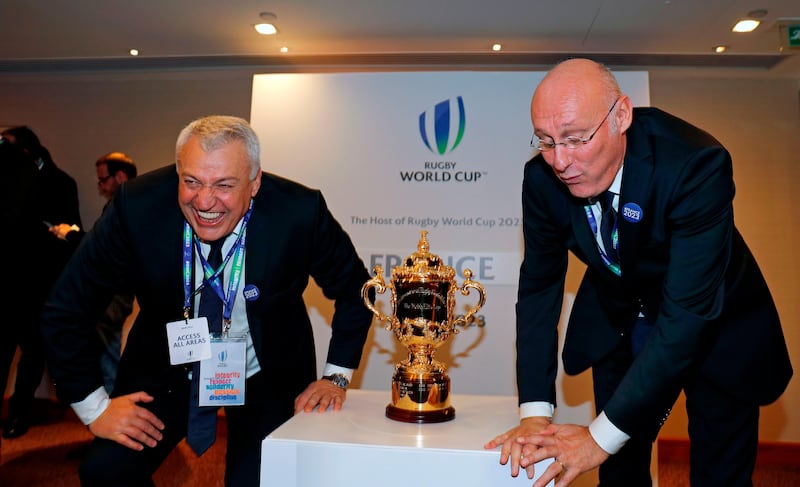France will host the 2023 Rugby World Cup after the council of the sport's governing body surprisingly went against the recommendations of an extensive evaluation report in a secret ballot on Wednesday.
South Africa had been recommended by World Rugby's Board but council members voted convincingly 24-15 for France, which also held the tournament in 2007, after Ireland was knocked out in the first round.
It was the first time the Board's recommendation has been ignored and the decision was immediately followed by questions over the selection process and the point of running an extensive and transparent evaluation process only for the decision to be taken in secret.
The shock announcement by World Rugby chairman Bill Beaumont was greeted by a moment of stunned silence, before the French delegation delivered a muffled cheer.
Congratulations to France who have been awarded Rugby World Cup 2023 following World Rugby Council's vote #RWC2023 pic.twitter.com/8enJhanPmW
— World Rugby (@WorldRugby) November 15, 2017
World rugby officials made repeated references to an "open and transparent" process but faced repeated questions about the final decision being made in secret and the "opaque" nature of the last weeks of campaigning.
Controversy has surrounded bids to host other major sporting events recently and although the Olympic Games remains a secret ballot, FIFA has changed its rules to make the vote for the next World Cup an open one.
"Our feeling was that in a secret ballot people could vote for whoever they wanted without fear," World Rugby CEO Brett Gosper said.
Beaumont had previously said he wanted the Council to follow the Board.
All the reaction from the Rugby World Cup 2023 host selection announcement #RWC2023 pic.twitter.com/pT48nRWR6L
— World Rugby (@WorldRugby) November 15, 2017
"Because the vote went to France after we had recommended South Africa doesn't mean it's humiliation (for World Rugby)," he said.
Bernard Laporte, president of the French rugby union, had publicly complained about the evaluation report, saying it was "nonsense and full of errors" and accusing World Rugby of incompetence.
But the former France coach was all smiles after securing the 10th edition of the tournament which began in 1987 when the sport was still amateur.
"We did dispute some aspects but I'm not saying that's why we won," he said. "We've won but it's really grass-roots rugby that has won. It's worth a billion euros for (French) shopkeepers, 17,000 jobs will be created and I'm very proud of that."
World Rugby chairman Bill Beaumont announces France as Rugby World Cup 2023 hosts #RWC2023 pic.twitter.com/o5aFJgXXGx
— World Rugby (@WorldRugby) November 15, 2017
Questions were soon raised about how France, which will also host the Olympic Games in Paris in 2024, had attracted so much support.
The French bid guaranteed World Rugby £150 million (Dh726m) - £30m more than the minimum requested and considerably more than both rivals - and offered a further £100m from the advance purchase of hospitality, travel and sponsorship programmes.
Coming after an expected dip in revenues from the 2019 tournament in Japan, that extra funding appeared to make an irresistible case for some voters.
South Africa, which staged the 1995 World Cup and won it in their first appearance after missing the first two because of the apartheid sporting ban, had been favourite after coming out clearly on top in the evaluation report.
“We are bitterly disappointed at this decision and would like to apologise to the people and government of South Africa for raising their hopes. ,” said Mr Mark Alexander, president of SA Rugby.
— Springboks (@Springboks) November 15, 2017
“We did everything in our power to bring the tournament to South Africa
“World Rugby ran exhaustive, transparent process for 15 months to identify best host nation, only for the process to go entirely opaque for past two weeks. The view of the experts and World Rugby’s leadership was overturned by @WorldRugby Council members: Jurie Roux SA Rugby CEO
— Springboks (@Springboks) November 15, 2017
Mark Alexander, president of SA Rugby, said he was "desolated" and fumed about breaches of protocol by other bidders.
"We produced a compelling bid that earned the unanimous recommendation of the Board. That recommendation was questioned last week by rivals, but endorsed a second time by World Rugby last week," he said.
"However, the view of the experts and World Rugby’s leadership was overturned by World Rugby Council members, who may have had other factors to take into account."
Ireland has never hosted the World Cup on its own.
"World Rugby needs to decide what sort of tournament it wants," said Philip Browne, CEO of the Irish Union. "Money shouldn't be everything. We could run a tournament perfectly well and produce significant revenues for rugby."





